Linear Algebra Assignment - Hashemite Kingdom of Jordan
VerifiedAdded on 2023/06/09
|12
|2085
|281
Homework Assignment
AI Summary
This document presents solutions to a Linear Algebra assignment, covering various topics such as matrix operations, vector spaces, subspaces, linear transformations, eigenvalues, eigenvectors, and diagonalizability. The solutions include step-by-step calculations, explanations, and justifications for each problem. The assignment explores concepts like finding the reduced row echelon form of a matrix, testing for diagonalizability, determining the dimension of a subspace, and finding the matrix of a linear transformation with respect to different bases. The solutions also address questions related to linear independence, orthogonal bases, and determinants. The document is a valuable resource for students studying linear algebra, providing a comprehensive guide to solving related problems and understanding the underlying concepts. This assignment covers multiple aspects of linear algebra, offering a comprehensive understanding of the subject matter.
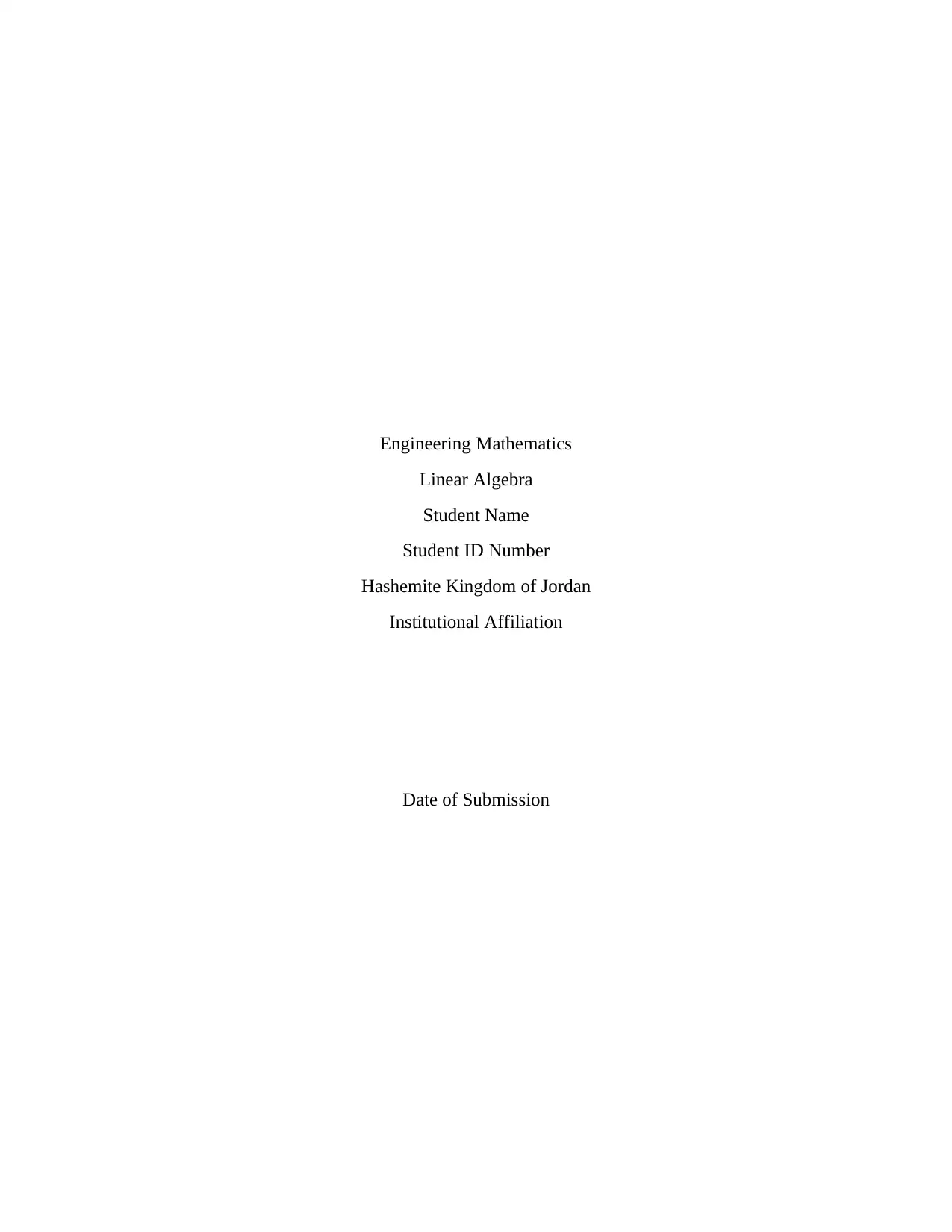
Engineering Mathematics
Linear Algebra
Student Name
Student ID Number
Hashemite Kingdom of Jordan
Institutional Affiliation
Date of Submission
Linear Algebra
Student Name
Student ID Number
Hashemite Kingdom of Jordan
Institutional Affiliation
Date of Submission
Paraphrase This Document
Need a fresh take? Get an instant paraphrase of this document with our AI Paraphraser
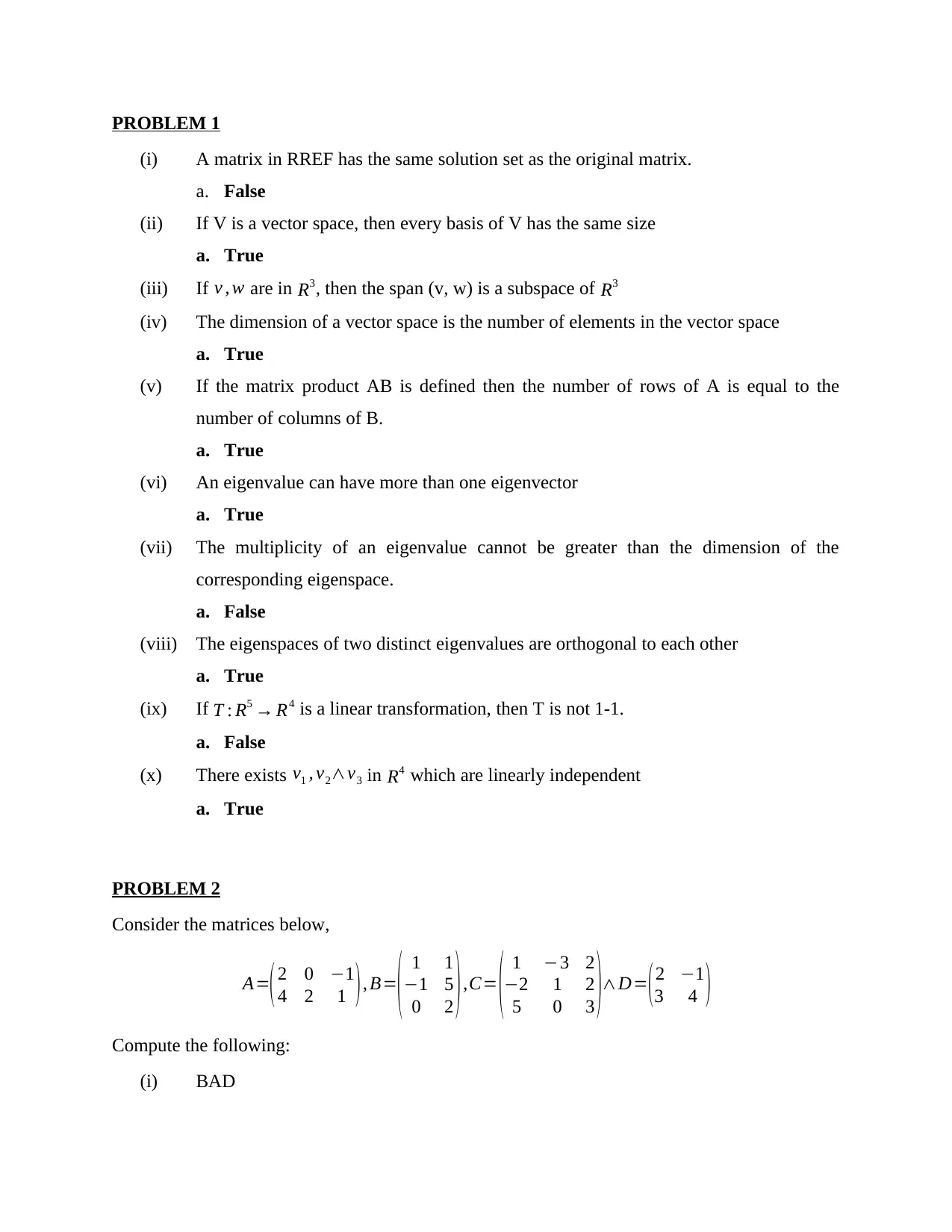
PROBLEM 1
(i) A matrix in RREF has the same solution set as the original matrix.
a. False
(ii) If V is a vector space, then every basis of V has the same size
a. True
(iii) If v , w are in R3, then the span (v, w) is a subspace of R3
(iv) The dimension of a vector space is the number of elements in the vector space
a. True
(v) If the matrix product AB is defined then the number of rows of A is equal to the
number of columns of B.
a. True
(vi) An eigenvalue can have more than one eigenvector
a. True
(vii) The multiplicity of an eigenvalue cannot be greater than the dimension of the
corresponding eigenspace.
a. False
(viii) The eigenspaces of two distinct eigenvalues are orthogonal to each other
a. True
(ix) If T : R5 → R4 is a linear transformation, then T is not 1-1.
a. False
(x) There exists v1 , v2∧v3 in R4 which are linearly independent
a. True
PROBLEM 2
Consider the matrices below,
A=( 2 0 −1
4 2 1 ) , B=
( 1 1
−1 5
0 2 ) ,C= ( 1 −3 2
−2 1 2
5 0 3 )∧D=( 2 −1
3 4 )
Compute the following:
(i) BAD
(i) A matrix in RREF has the same solution set as the original matrix.
a. False
(ii) If V is a vector space, then every basis of V has the same size
a. True
(iii) If v , w are in R3, then the span (v, w) is a subspace of R3
(iv) The dimension of a vector space is the number of elements in the vector space
a. True
(v) If the matrix product AB is defined then the number of rows of A is equal to the
number of columns of B.
a. True
(vi) An eigenvalue can have more than one eigenvector
a. True
(vii) The multiplicity of an eigenvalue cannot be greater than the dimension of the
corresponding eigenspace.
a. False
(viii) The eigenspaces of two distinct eigenvalues are orthogonal to each other
a. True
(ix) If T : R5 → R4 is a linear transformation, then T is not 1-1.
a. False
(x) There exists v1 , v2∧v3 in R4 which are linearly independent
a. True
PROBLEM 2
Consider the matrices below,
A=( 2 0 −1
4 2 1 ) , B=
( 1 1
−1 5
0 2 ) ,C= ( 1 −3 2
−2 1 2
5 0 3 )∧D=( 2 −1
3 4 )
Compute the following:
(i) BAD
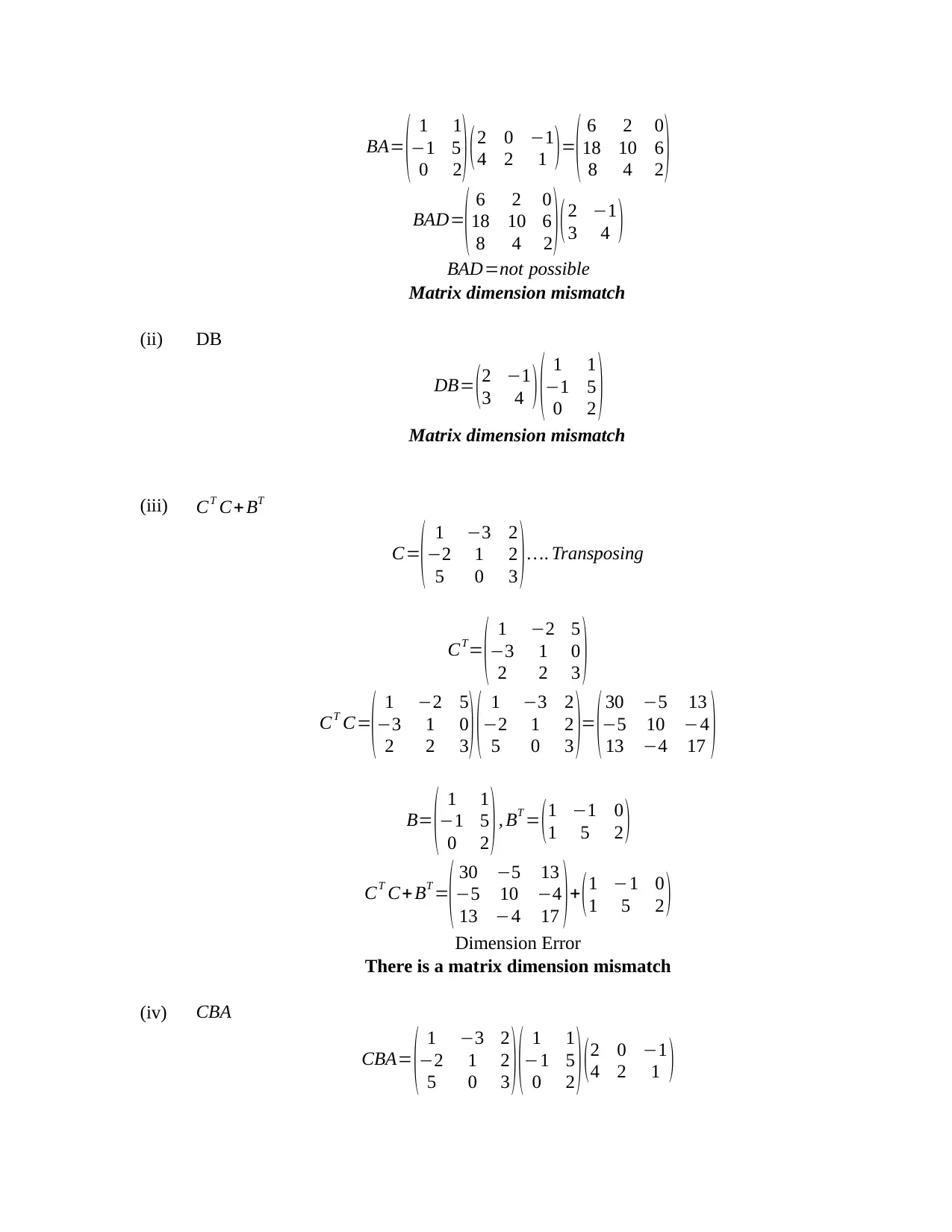
BA= ( 1 1
−1 5
0 2 ) (2 0 −1
4 2 1 )=
( 6 2 0
18 10 6
8 4 2 )
BAD=
( 6 2 0
18 10 6
8 4 2 ) ( 2 −1
3 4 )
BAD=not possible
Matrix dimension mismatch
(ii) DB
DB= (2 −1
3 4 ) ( 1 1
−1 5
0 2 )
Matrix dimension mismatch
(iii) CT C+ BT
C=
( 1 −3 2
−2 1 2
5 0 3 )…. Transposing
CT= ( 1 −2 5
−3 1 0
2 2 3 )
CT C=
( 1 −2 5
−3 1 0
2 2 3 )( 1 −3 2
−2 1 2
5 0 3 )= ( 30 −5 13
−5 10 −4
13 −4 17 )
B= ( 1 1
−1 5
0 2 ), BT = (1 −1 0
1 5 2 )
CT C+ BT =
( 30 −5 13
−5 10 −4
13 −4 17 )+ (1 −1 0
1 5 2 )
Dimension Error
There is a matrix dimension mismatch
(iv) CBA
CBA= ( 1 −3 2
−2 1 2
5 0 3 )( 1 1
−1 5
0 2 ) (2 0 −1
4 2 1 )
−1 5
0 2 ) (2 0 −1
4 2 1 )=
( 6 2 0
18 10 6
8 4 2 )
BAD=
( 6 2 0
18 10 6
8 4 2 ) ( 2 −1
3 4 )
BAD=not possible
Matrix dimension mismatch
(ii) DB
DB= (2 −1
3 4 ) ( 1 1
−1 5
0 2 )
Matrix dimension mismatch
(iii) CT C+ BT
C=
( 1 −3 2
−2 1 2
5 0 3 )…. Transposing
CT= ( 1 −2 5
−3 1 0
2 2 3 )
CT C=
( 1 −2 5
−3 1 0
2 2 3 )( 1 −3 2
−2 1 2
5 0 3 )= ( 30 −5 13
−5 10 −4
13 −4 17 )
B= ( 1 1
−1 5
0 2 ), BT = (1 −1 0
1 5 2 )
CT C+ BT =
( 30 −5 13
−5 10 −4
13 −4 17 )+ (1 −1 0
1 5 2 )
Dimension Error
There is a matrix dimension mismatch
(iv) CBA
CBA= ( 1 −3 2
−2 1 2
5 0 3 )( 1 1
−1 5
0 2 ) (2 0 −1
4 2 1 )
⊘ This is a preview!⊘
Do you want full access?
Subscribe today to unlock all pages.

Trusted by 1+ million students worldwide
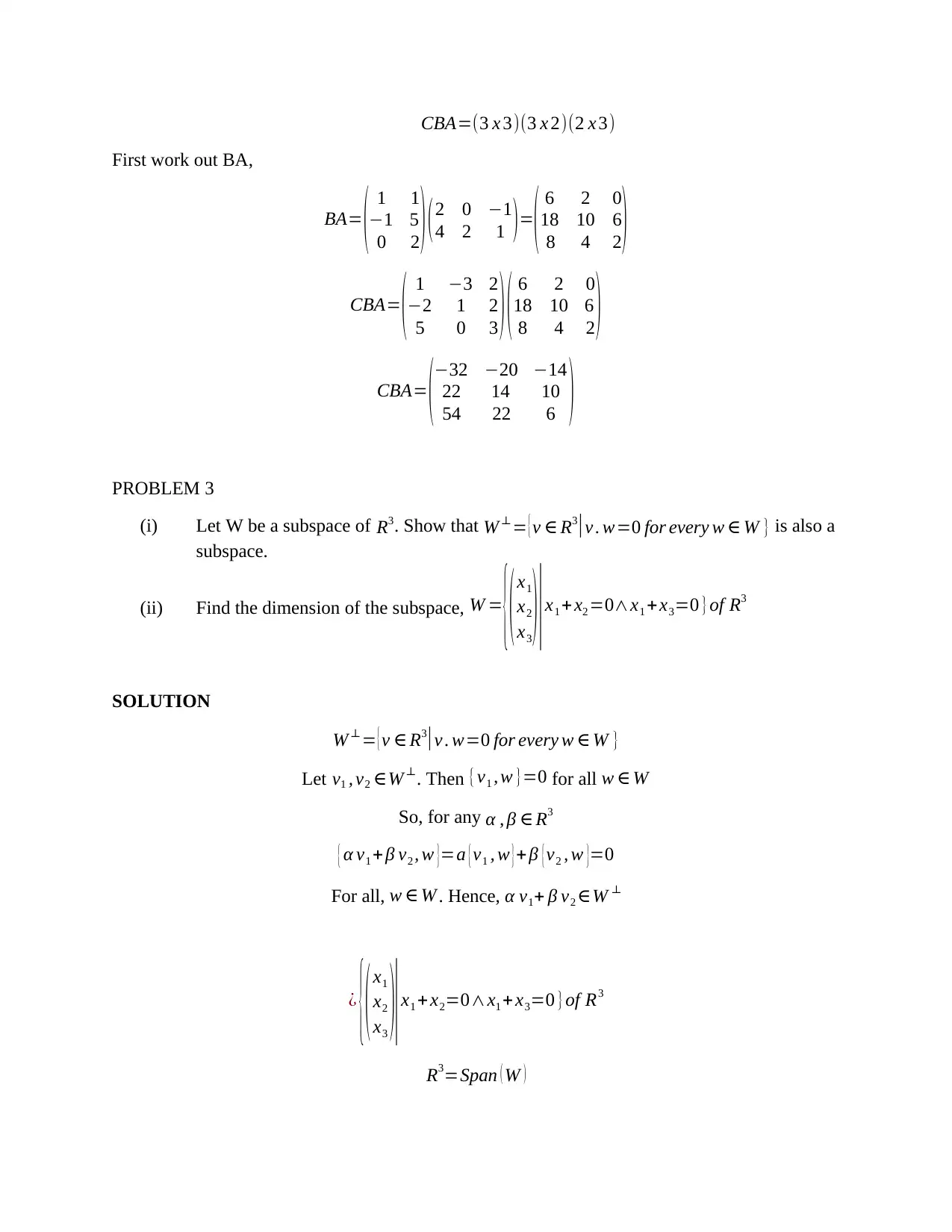
CBA=(3 x 3)(3 x 2)(2 x 3)
First work out BA,
BA= ( 1 1
−1 5
0 2 ) (2 0 −1
4 2 1 )=
( 6 2 0
18 10 6
8 4 2 )
CBA= ( 1 −3 2
−2 1 2
5 0 3 )( 6 2 0
18 10 6
8 4 2)
CBA= (−32 −20 −14
22 14 10
54 22 6 )
PROBLEM 3
(i) Let W be a subspace of R3. Show that W⊥ = {v ∈ R3
|v . w=0 for every w ∈ W } is also a
subspace.
(ii) Find the dimension of the subspace, W =
{( x1
x2
x3
)| x1 + x2 =0∧x1 +x3=0 }of R3
SOLUTION
W ⊥= {v ∈ R3
|v . w=0 for every w ∈ W }
Let v1 , v2 ∈W ⊥. Then {v1 , w }=0 for all w ∈ W
So, for any α , β ∈ R3
{ α v1 +β v2 , w }=a {v1 , w }+ β {v2 , w }=0
For all, w ∈ W . Hence, α v1+ β v2 ∈W ⊥
¿
{( x1
x2
x3
)| x1 + x2=0∧x1 + x3=0 }of R3
R3=Span ( W )
First work out BA,
BA= ( 1 1
−1 5
0 2 ) (2 0 −1
4 2 1 )=
( 6 2 0
18 10 6
8 4 2 )
CBA= ( 1 −3 2
−2 1 2
5 0 3 )( 6 2 0
18 10 6
8 4 2)
CBA= (−32 −20 −14
22 14 10
54 22 6 )
PROBLEM 3
(i) Let W be a subspace of R3. Show that W⊥ = {v ∈ R3
|v . w=0 for every w ∈ W } is also a
subspace.
(ii) Find the dimension of the subspace, W =
{( x1
x2
x3
)| x1 + x2 =0∧x1 +x3=0 }of R3
SOLUTION
W ⊥= {v ∈ R3
|v . w=0 for every w ∈ W }
Let v1 , v2 ∈W ⊥. Then {v1 , w }=0 for all w ∈ W
So, for any α , β ∈ R3
{ α v1 +β v2 , w }=a {v1 , w }+ β {v2 , w }=0
For all, w ∈ W . Hence, α v1+ β v2 ∈W ⊥
¿
{( x1
x2
x3
)| x1 + x2=0∧x1 + x3=0 }of R3
R3=Span ( W )
Paraphrase This Document
Need a fresh take? Get an instant paraphrase of this document with our AI Paraphraser
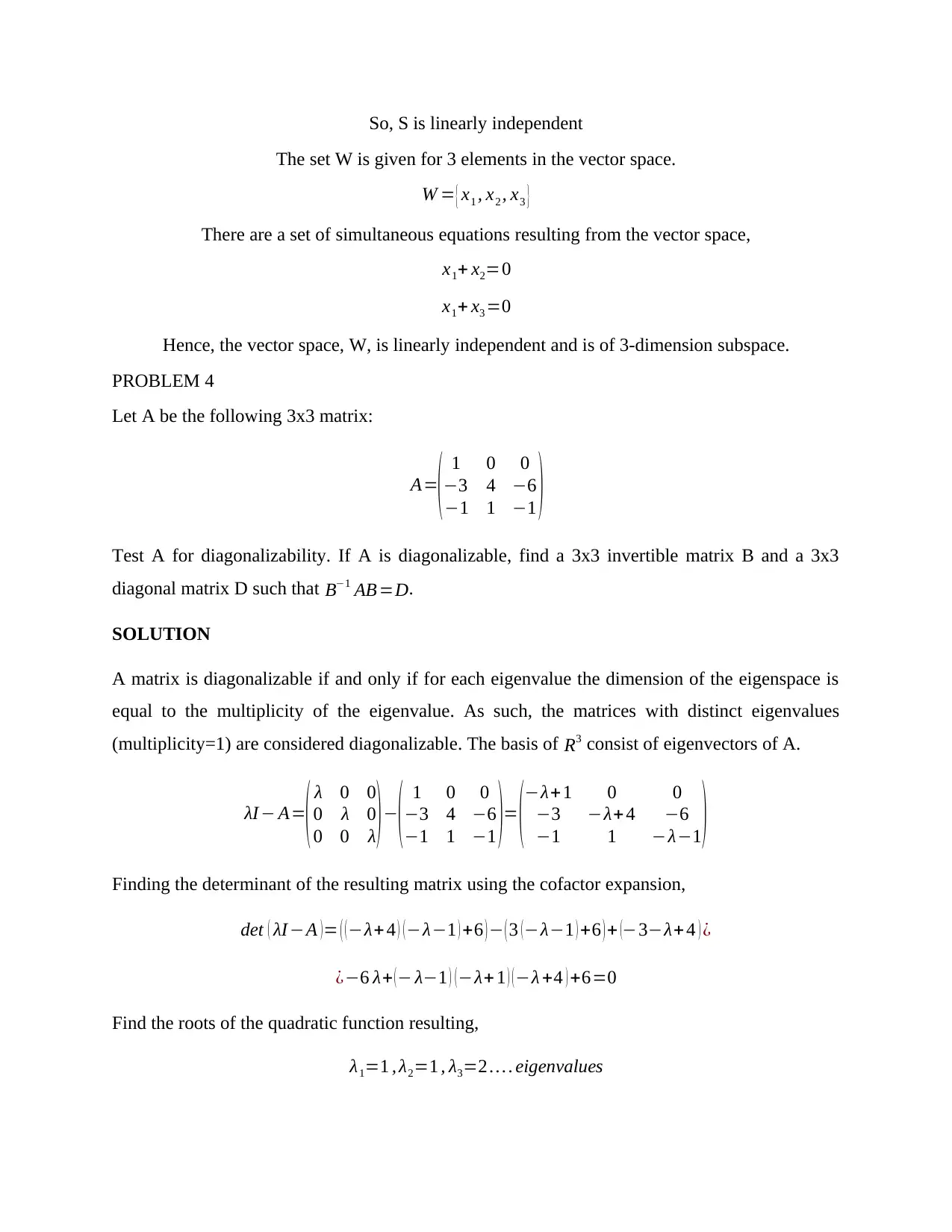
So, S is linearly independent
The set W is given for 3 elements in the vector space.
W = { x1 , x2 , x3 }
There are a set of simultaneous equations resulting from the vector space,
x1+ x2=0
x1+ x3 =0
Hence, the vector space, W, is linearly independent and is of 3-dimension subspace.
PROBLEM 4
Let A be the following 3x3 matrix:
A=
( 1 0 0
−3 4 −6
−1 1 −1 )
Test A for diagonalizability. If A is diagonalizable, find a 3x3 invertible matrix B and a 3x3
diagonal matrix D such that B−1 AB =D.
SOLUTION
A matrix is diagonalizable if and only if for each eigenvalue the dimension of the eigenspace is
equal to the multiplicity of the eigenvalue. As such, the matrices with distinct eigenvalues
(multiplicity=1) are considered diagonalizable. The basis of R3 consist of eigenvectors of A.
λI − A=
( λ 0 0
0 λ 0
0 0 λ )−
( 1 0 0
−3 4 −6
−1 1 −1 )= (−λ+1 0 0
−3 −λ+ 4 −6
−1 1 −λ−1 )
Finding the determinant of the resulting matrix using the cofactor expansion,
det ( λI −A )= ( (−λ+4 ) (−λ−1 ) +6 ) − ( 3 (−λ−1 ) +6 ) + (−3−λ+ 4 ) ¿
¿−6 λ+ (− λ−1 ) (−λ+ 1 ) (−λ +4 ) +6=0
Find the roots of the quadratic function resulting,
λ1=1 , λ2=1 , λ3=2 … . eigenvalues
The set W is given for 3 elements in the vector space.
W = { x1 , x2 , x3 }
There are a set of simultaneous equations resulting from the vector space,
x1+ x2=0
x1+ x3 =0
Hence, the vector space, W, is linearly independent and is of 3-dimension subspace.
PROBLEM 4
Let A be the following 3x3 matrix:
A=
( 1 0 0
−3 4 −6
−1 1 −1 )
Test A for diagonalizability. If A is diagonalizable, find a 3x3 invertible matrix B and a 3x3
diagonal matrix D such that B−1 AB =D.
SOLUTION
A matrix is diagonalizable if and only if for each eigenvalue the dimension of the eigenspace is
equal to the multiplicity of the eigenvalue. As such, the matrices with distinct eigenvalues
(multiplicity=1) are considered diagonalizable. The basis of R3 consist of eigenvectors of A.
λI − A=
( λ 0 0
0 λ 0
0 0 λ )−
( 1 0 0
−3 4 −6
−1 1 −1 )= (−λ+1 0 0
−3 −λ+ 4 −6
−1 1 −λ−1 )
Finding the determinant of the resulting matrix using the cofactor expansion,
det ( λI −A )= ( (−λ+4 ) (−λ−1 ) +6 ) − ( 3 (−λ−1 ) +6 ) + (−3−λ+ 4 ) ¿
¿−6 λ+ (− λ−1 ) (−λ+ 1 ) (−λ +4 ) +6=0
Find the roots of the quadratic function resulting,
λ1=1 , λ2=1 , λ3=2 … . eigenvalues
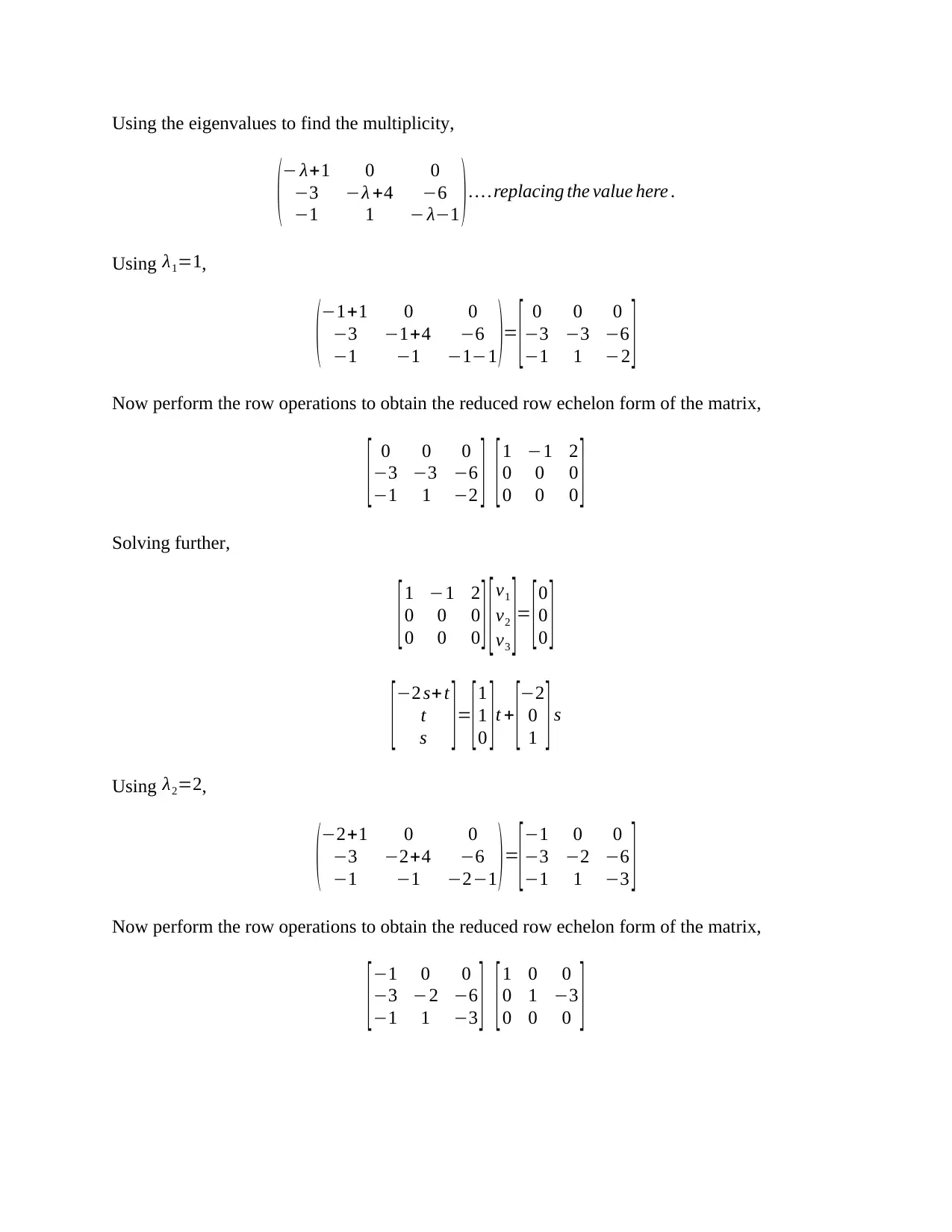
Using the eigenvalues to find the multiplicity,
(− λ+1 0 0
−3 −λ +4 −6
−1 1 − λ−1 )… .replacing the value here .
Using λ1=1,
(−1+1 0 0
−3 −1+4 −6
−1 −1 −1−1 )= [ 0 0 0
−3 −3 −6
−1 1 −2 ]
Now perform the row operations to obtain the reduced row echelon form of the matrix,
[ 0 0 0
−3 −3 −6
−1 1 −2 ] [1 −1 2
0 0 0
0 0 0 ]
Solving further,
[ 1 −1 2
0 0 0
0 0 0 ] [ v1
v2
v3 ]= [ 0
0
0 ]
[−2 s+ t
t
s ]=
[1
1
0 ]t + [−2
0
1 ] s
Using λ2=2,
(−2+1 0 0
−3 −2+4 −6
−1 −1 −2−1 )=
[−1 0 0
−3 −2 −6
−1 1 −3 ]
Now perform the row operations to obtain the reduced row echelon form of the matrix,
[−1 0 0
−3 −2 −6
−1 1 −3 ] [1 0 0
0 1 −3
0 0 0 ]
(− λ+1 0 0
−3 −λ +4 −6
−1 1 − λ−1 )… .replacing the value here .
Using λ1=1,
(−1+1 0 0
−3 −1+4 −6
−1 −1 −1−1 )= [ 0 0 0
−3 −3 −6
−1 1 −2 ]
Now perform the row operations to obtain the reduced row echelon form of the matrix,
[ 0 0 0
−3 −3 −6
−1 1 −2 ] [1 −1 2
0 0 0
0 0 0 ]
Solving further,
[ 1 −1 2
0 0 0
0 0 0 ] [ v1
v2
v3 ]= [ 0
0
0 ]
[−2 s+ t
t
s ]=
[1
1
0 ]t + [−2
0
1 ] s
Using λ2=2,
(−2+1 0 0
−3 −2+4 −6
−1 −1 −2−1 )=
[−1 0 0
−3 −2 −6
−1 1 −3 ]
Now perform the row operations to obtain the reduced row echelon form of the matrix,
[−1 0 0
−3 −2 −6
−1 1 −3 ] [1 0 0
0 1 −3
0 0 0 ]
⊘ This is a preview!⊘
Do you want full access?
Subscribe today to unlock all pages.

Trusted by 1+ million students worldwide
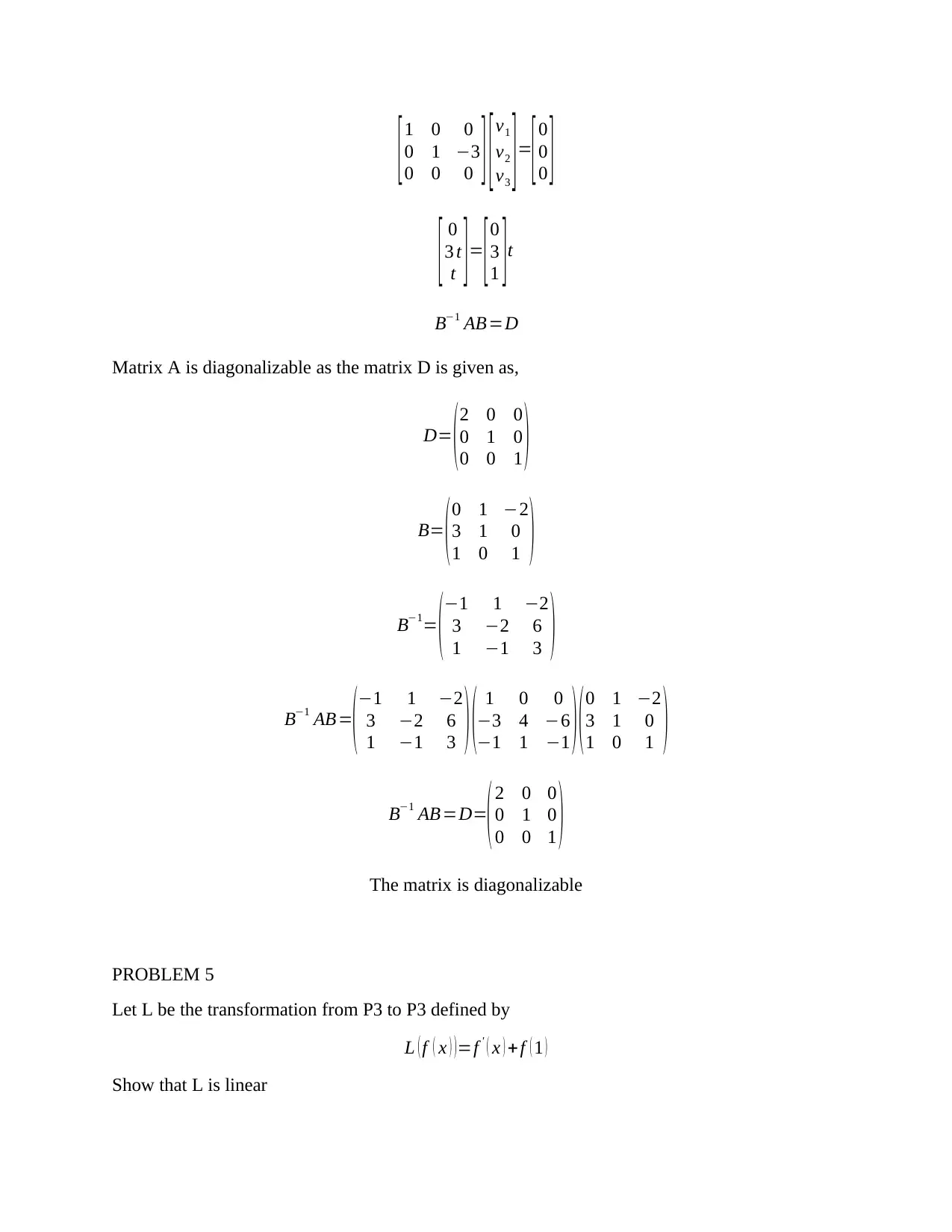
[1 0 0
0 1 −3
0 0 0 ] [v1
v2
v3 ]=
[0
0
0 ]
[ 0
3 t
t ]=
[0
3
1 ]t
B−1 AB=D
Matrix A is diagonalizable as the matrix D is given as,
D= (2 0 0
0 1 0
0 0 1 )
B= (0 1 −2
3 1 0
1 0 1 )
B−1= (−1 1 −2
3 −2 6
1 −1 3 )
B−1 AB=
(−1 1 −2
3 −2 6
1 −1 3 )( 1 0 0
−3 4 −6
−1 1 −1 )(0 1 −2
3 1 0
1 0 1 )
B−1 AB=D=
(2 0 0
0 1 0
0 0 1 )
The matrix is diagonalizable
PROBLEM 5
Let L be the transformation from P3 to P3 defined by
L ( f ( x ) )=f ' ( x ) +f ( 1 )
Show that L is linear
0 1 −3
0 0 0 ] [v1
v2
v3 ]=
[0
0
0 ]
[ 0
3 t
t ]=
[0
3
1 ]t
B−1 AB=D
Matrix A is diagonalizable as the matrix D is given as,
D= (2 0 0
0 1 0
0 0 1 )
B= (0 1 −2
3 1 0
1 0 1 )
B−1= (−1 1 −2
3 −2 6
1 −1 3 )
B−1 AB=
(−1 1 −2
3 −2 6
1 −1 3 )( 1 0 0
−3 4 −6
−1 1 −1 )(0 1 −2
3 1 0
1 0 1 )
B−1 AB=D=
(2 0 0
0 1 0
0 0 1 )
The matrix is diagonalizable
PROBLEM 5
Let L be the transformation from P3 to P3 defined by
L ( f ( x ) )=f ' ( x ) +f ( 1 )
Show that L is linear
Paraphrase This Document
Need a fresh take? Get an instant paraphrase of this document with our AI Paraphraser
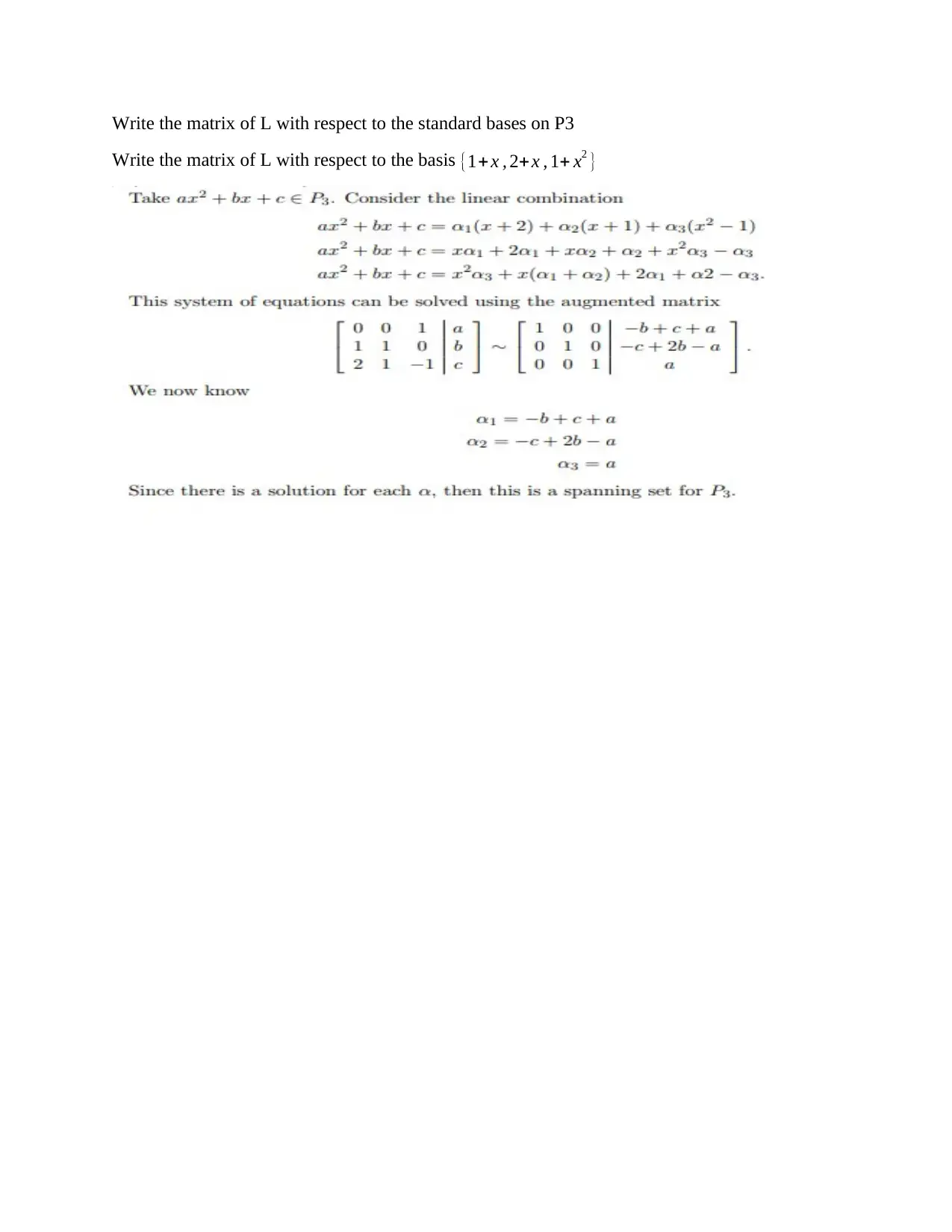
Write the matrix of L with respect to the standard bases on P3
Write the matrix of L with respect to the basis {1+ x , 2+ x , 1+ x2 }
Write the matrix of L with respect to the basis {1+ x , 2+ x , 1+ x2 }
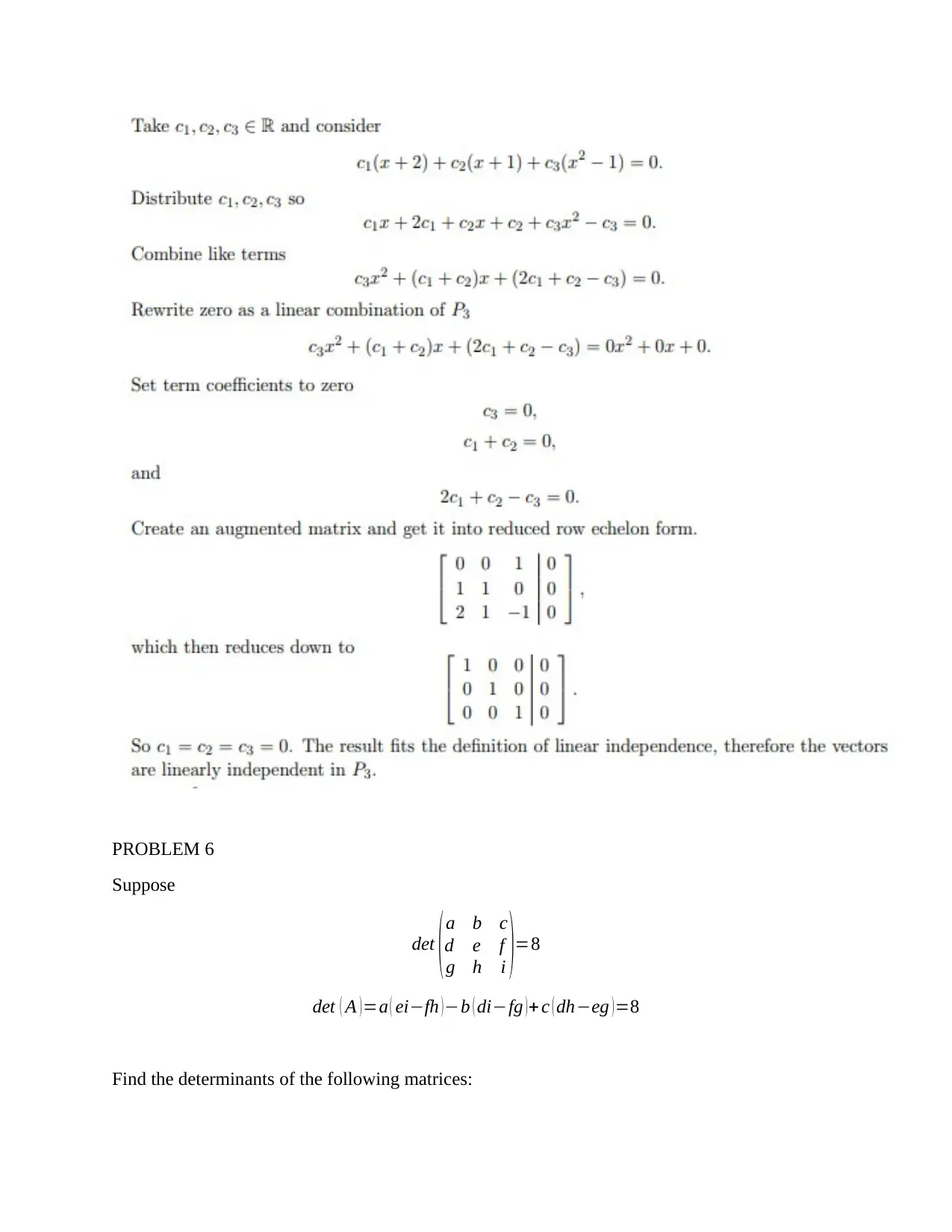
PROBLEM 6
Suppose
det ( a b c
d e f
g h i )=8
det ( A ) =a ( ei−fh ) −b ( di−fg ) + c ( dh−eg ) =8
Find the determinants of the following matrices:
Suppose
det ( a b c
d e f
g h i )=8
det ( A ) =a ( ei−fh ) −b ( di−fg ) + c ( dh−eg ) =8
Find the determinants of the following matrices:
⊘ This is a preview!⊘
Do you want full access?
Subscribe today to unlock all pages.

Trusted by 1+ million students worldwide
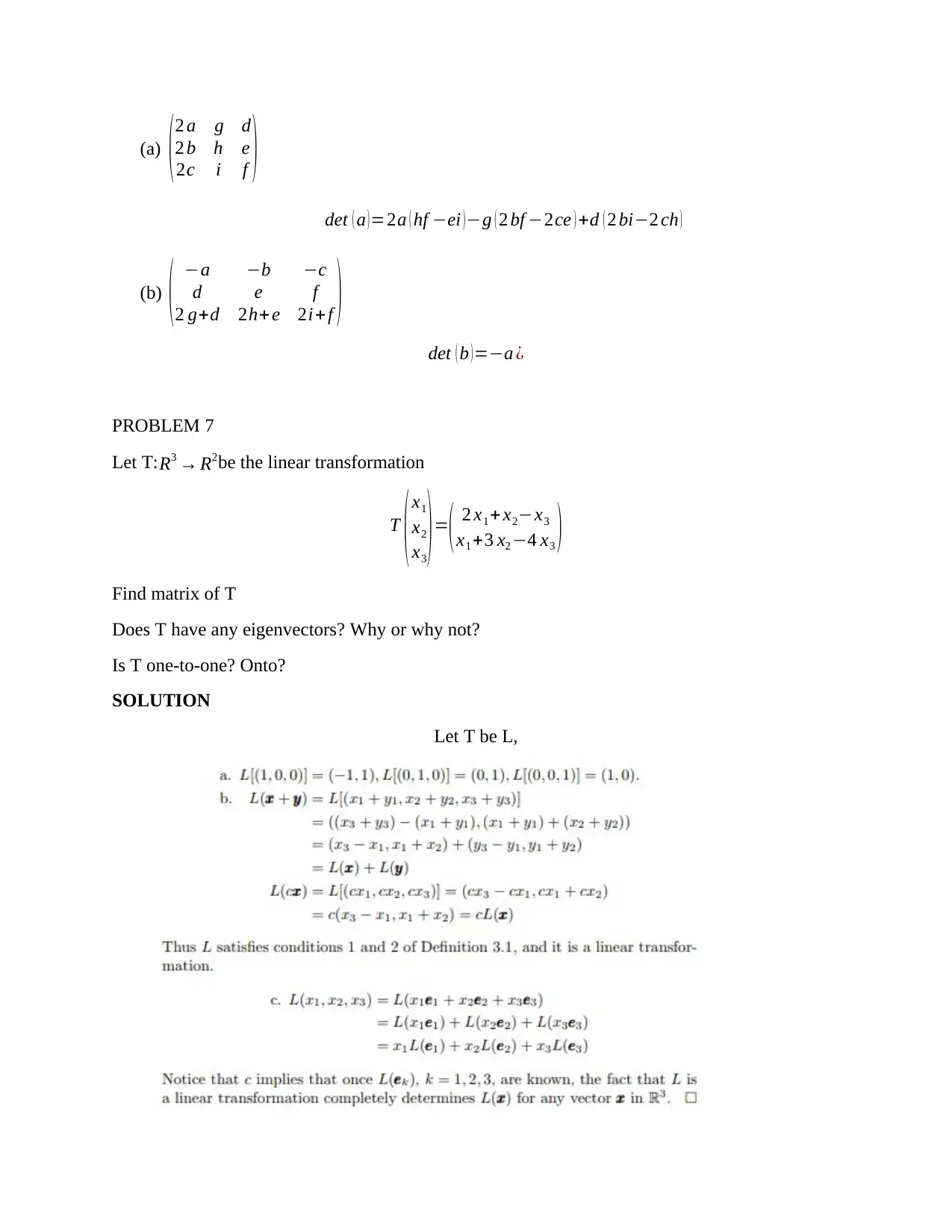
(a) (2 a g d
2 b h e
2c i f ) det ( a )=2a ( hf −ei )−g ( 2 bf −2ce ) +d ( 2 bi−2 ch )
(b) ( −a −b −c
d e f
2 g+d 2h+ e 2i+ f ) det ( b )=−a ¿
PROBLEM 7
Let T:R3 → R2be the linear transformation
T
( x1
x2
x3
) =
( 2 x1 + x2−x3
x1 +3 x2 −4 x3 )
Find matrix of T
Does T have any eigenvectors? Why or why not?
Is T one-to-one? Onto?
SOLUTION
Let T be L,
2 b h e
2c i f ) det ( a )=2a ( hf −ei )−g ( 2 bf −2ce ) +d ( 2 bi−2 ch )
(b) ( −a −b −c
d e f
2 g+d 2h+ e 2i+ f ) det ( b )=−a ¿
PROBLEM 7
Let T:R3 → R2be the linear transformation
T
( x1
x2
x3
) =
( 2 x1 + x2−x3
x1 +3 x2 −4 x3 )
Find matrix of T
Does T have any eigenvectors? Why or why not?
Is T one-to-one? Onto?
SOLUTION
Let T be L,
Paraphrase This Document
Need a fresh take? Get an instant paraphrase of this document with our AI Paraphraser
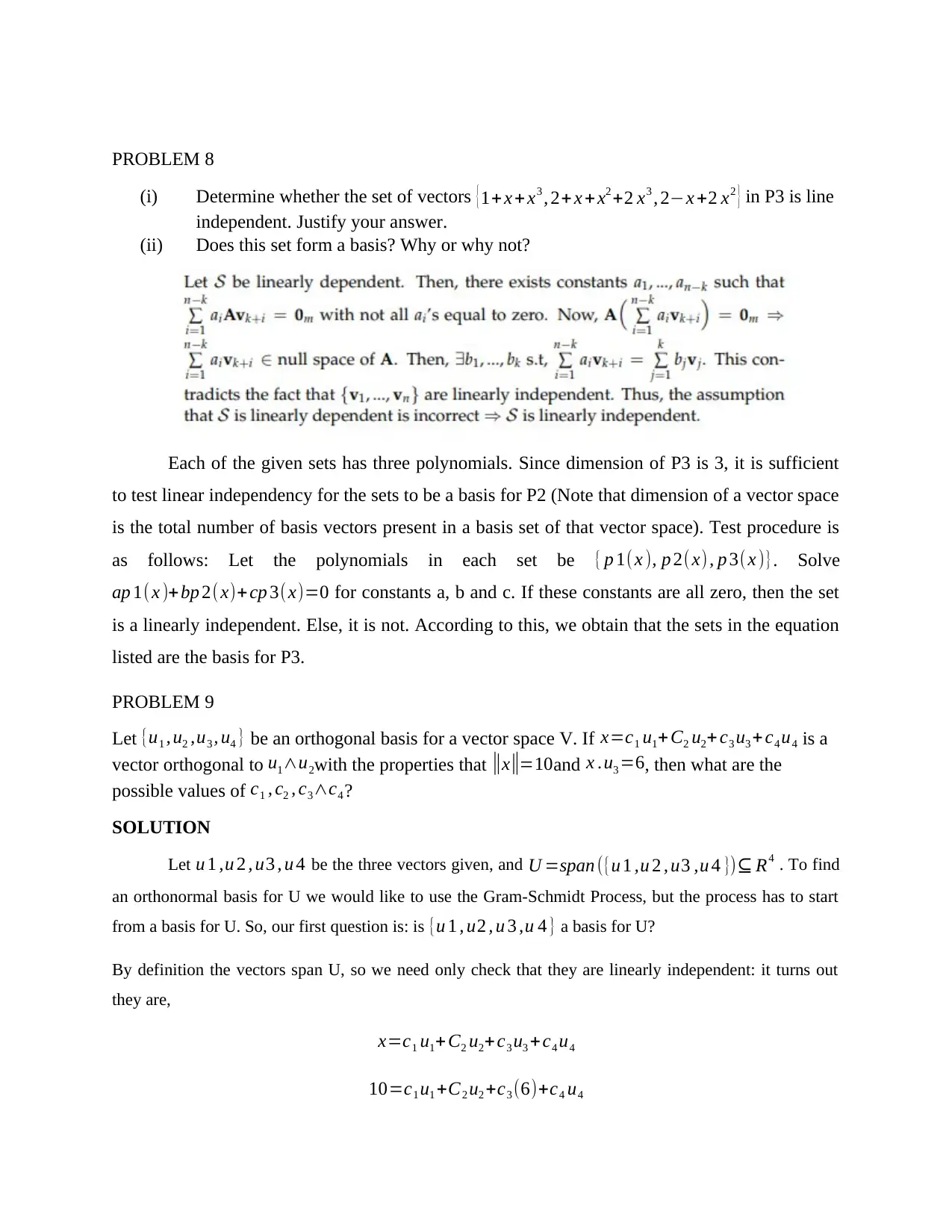
PROBLEM 8
(i) Determine whether the set of vectors {1+x + x3 , 2+ x + x2 +2 x3 , 2−x +2 x2 } in P3 is line
independent. Justify your answer.
(ii) Does this set form a basis? Why or why not?
Each of the given sets has three polynomials. Since dimension of P3 is 3, it is sufficient
to test linear independency for the sets to be a basis for P2 (Note that dimension of a vector space
is the total number of basis vectors present in a basis set of that vector space). Test procedure is
as follows: Let the polynomials in each set be { p 1( x ), p 2( x), p 3( x )}. Solve
ap 1( x )+bp 2( x)+ cp 3(x)=0 for constants a, b and c. If these constants are all zero, then the set
is a linearly independent. Else, it is not. According to this, we obtain that the sets in the equation
listed are the basis for P3.
PROBLEM 9
Let {u1 , u2 ,u3 , u4 } be an orthogonal basis for a vector space V. If x=c1 u1+ C2 u2+ c3 u3 + c4 u4 is a
vector orthogonal to u1∧u2with the properties that ||x ||=10and x .u3 =6, then what are the
possible values of c1 , c2 , c3∧c4?
SOLUTION
Let u 1 ,u 2 , u3 , u 4 be the three vectors given, and U =span ({u 1 ,u 2 , u3 ,u 4 })⊆ R4 . To find
an orthonormal basis for U we would like to use the Gram-Schmidt Process, but the process has to start
from a basis for U. So, our first question is: is {u 1 , u2 , u 3 ,u 4 } a basis for U?
By definition the vectors span U, so we need only check that they are linearly independent: it turns out
they are,
x=c1 u1+ C2 u2+c3 u3 +c4 u4
10=c1 u1 +C2 u2 +c3 (6)+c4 u4
(i) Determine whether the set of vectors {1+x + x3 , 2+ x + x2 +2 x3 , 2−x +2 x2 } in P3 is line
independent. Justify your answer.
(ii) Does this set form a basis? Why or why not?
Each of the given sets has three polynomials. Since dimension of P3 is 3, it is sufficient
to test linear independency for the sets to be a basis for P2 (Note that dimension of a vector space
is the total number of basis vectors present in a basis set of that vector space). Test procedure is
as follows: Let the polynomials in each set be { p 1( x ), p 2( x), p 3( x )}. Solve
ap 1( x )+bp 2( x)+ cp 3(x)=0 for constants a, b and c. If these constants are all zero, then the set
is a linearly independent. Else, it is not. According to this, we obtain that the sets in the equation
listed are the basis for P3.
PROBLEM 9
Let {u1 , u2 ,u3 , u4 } be an orthogonal basis for a vector space V. If x=c1 u1+ C2 u2+ c3 u3 + c4 u4 is a
vector orthogonal to u1∧u2with the properties that ||x ||=10and x .u3 =6, then what are the
possible values of c1 , c2 , c3∧c4?
SOLUTION
Let u 1 ,u 2 , u3 , u 4 be the three vectors given, and U =span ({u 1 ,u 2 , u3 ,u 4 })⊆ R4 . To find
an orthonormal basis for U we would like to use the Gram-Schmidt Process, but the process has to start
from a basis for U. So, our first question is: is {u 1 , u2 , u 3 ,u 4 } a basis for U?
By definition the vectors span U, so we need only check that they are linearly independent: it turns out
they are,
x=c1 u1+ C2 u2+c3 u3 +c4 u4
10=c1 u1 +C2 u2 +c3 (6)+c4 u4

⊘ This is a preview!⊘
Do you want full access?
Subscribe today to unlock all pages.

Trusted by 1+ million students worldwide
1 out of 12
Related Documents
Your All-in-One AI-Powered Toolkit for Academic Success.
+13062052269
info@desklib.com
Available 24*7 on WhatsApp / Email
![[object Object]](/_next/static/media/star-bottom.7253800d.svg)
Unlock your academic potential
Copyright © 2020–2026 A2Z Services. All Rights Reserved. Developed and managed by ZUCOL.





